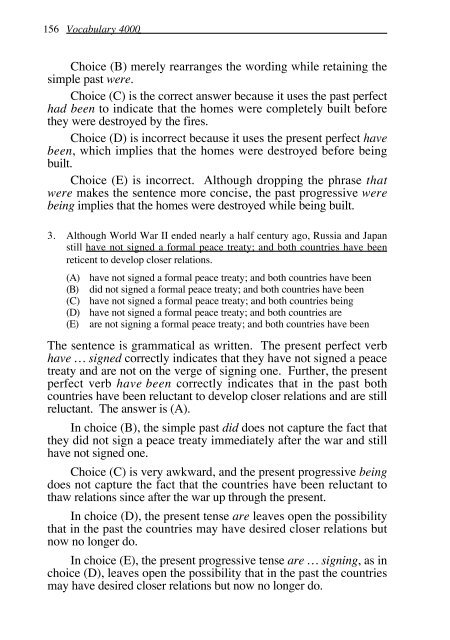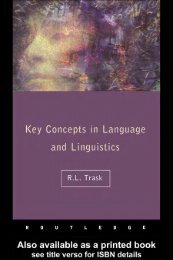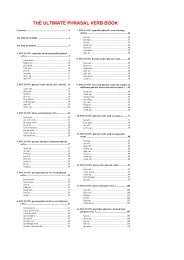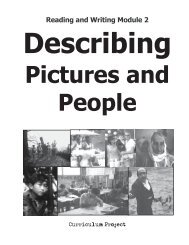Vocabulary 4000 - Noel's ESL eBook Library
Vocabulary 4000 - Noel's ESL eBook Library
Vocabulary 4000 - Noel's ESL eBook Library
You also want an ePaper? Increase the reach of your titles
YUMPU automatically turns print PDFs into web optimized ePapers that Google loves.
156 <strong>Vocabulary</strong> <strong>4000</strong><br />
Choice (B) merely rearranges the wording while retaining the<br />
simple past were.<br />
Choice (C) is the correct answer because it uses the past perfect<br />
had been to indicate that the homes were completely built before<br />
they were destroyed by the fires.<br />
Choice (D) is incorrect because it uses the present perfect have<br />
been, which implies that the homes were destroyed before being<br />
built.<br />
Choice (E) is incorrect. Although dropping the phrase that<br />
were makes the sentence more concise, the past progressive were<br />
being implies that the homes were destroyed while being built.<br />
3. Although World War II ended nearly a half century ago, Russia and Japan<br />
still have not signed a formal peace treaty; and both countries have been<br />
reticent to develop closer relations.<br />
(A) have not signed a formal peace treaty; and both countries have been<br />
(B) did not signed a formal peace treaty; and both countries have been<br />
(C) have not signed a formal peace treaty; and both countries being<br />
(D) have not signed a formal peace treaty; and both countries are<br />
(E) are not signing a formal peace treaty; and both countries have been<br />
The sentence is grammatical as written. The present perfect verb<br />
have … signed correctly indicates that they have not signed a peace<br />
treaty and are not on the verge of signing one. Further, the present<br />
perfect verb have been correctly indicates that in the past both<br />
countries have been reluctant to develop closer relations and are still<br />
reluctant. The answer is (A).<br />
In choice (B), the simple past did does not capture the fact that<br />
they did not sign a peace treaty immediately after the war and still<br />
have not signed one.<br />
Choice (C) is very awkward, and the present progressive being<br />
does not capture the fact that the countries have been reluctant to<br />
thaw relations since after the war up through the present.<br />
In choice (D), the present tense are leaves open the possibility<br />
that in the past the countries may have desired closer relations but<br />
now no longer do.<br />
In choice (E), the present progressive tense are … signing, as in<br />
choice (D), leaves open the possibility that in the past the countries<br />
may have desired closer relations but now no longer do.











